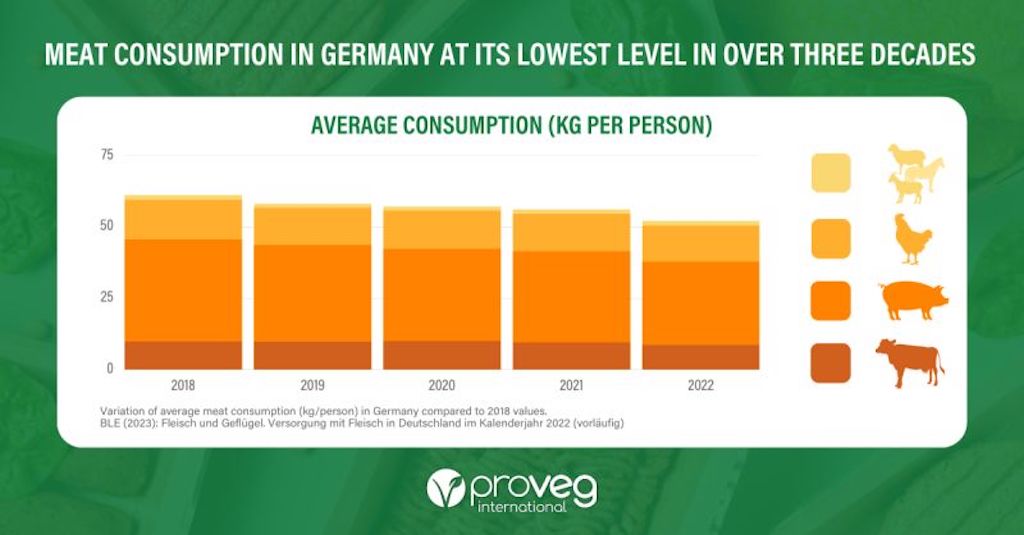Germany Drops ‘Completely Unreasonable’ Meat Consumption To Record Low
3 Mins Read
Germans keep reducing their meat consumption, a new report finds.
New data released by the Federal Information Centre for Agriculture in Germany shows that meat consumption per capita decreased by approximately 4.2 kg in 2022, dropping to 52 kg per person, the lowest it has been since the calculations began in 1989. This aligns with previous findings that 55% of Germans consumers describe themselves as flexitarian, the highest level in Europe.
The findings
The report also reveals that Germans consumed around 2.8 kg less pork, 900 grams less beef and veal, and 400 grams less poultry in 2022.
The numbers show net production of animal meat in the country was down, with 9.8 percent less pork and 8.2 percent less beef and veal produced domestically compared to 2021, and a nearly three percent reduction in net production of poultry meat.

Germany was eighth on Our World In Data’s 2020 list of top meat-eating countries per capita.
Germany’s declining meat consumption trend has continued over the past few years — a shift reinforced by Health Minister Karl Lauterbach’s call to consume less meat. In 2022, he declared that “we will have to eat much less meat,” adding that “in the long term, we could reduce meat consumption by 80 percent. Not only in Germany, but worldwide, because it is simply very difficult to produce meat without massive CO2 waste.”
The German minister also said meat consumption in Germany is “completely unreasonable” in many respects, “bordering on the delusional if you think about it.”
Lauterbach says it starts with cruelty to animals, “the animals usually live in torment, the cheap meat cannot be produced otherwise.”

Plant-based on the rise
Meanwhile, Nielsen data revealed that sales of plant-based foods in Europe grew six percent in 2022, reaching €5.7 billion — a 22 percent increase over 2020. Germany accounted for the highest sales value of plant-based food across Europe, while the Netherlands had the highest average plant-based food spend per capita.
ProVeg’s Vice President, Jasmijn de Boo, highlighted that public procurement of plant-based foods, policies to encourage the growth of the plant-based industry, investment in alternative protein product research and innovation, and incentives for farmers to transition away from meat and dairy production are among the actions urgently needed to avoid climate breakdown. She emphasized that other countries should replicate the trend seen in Germany.

“We’re really pleased to see the continued decline in meat consumption in Germany, which has been helped by people following flexitarian diets,” de Boo said in a statement. “It is imperative that policies are implemented to ensure that the trend seen in Germany is replicated elsewhere.
The news comes on the heels of Raging Pig’s vegan bacon national rollout across Germany’s Vincent Vegan restaurant chain. The country has seen other notable vegan launches recently, including the expansion of Singapore’s TiNDLE vegan chicken into 6,000 German retailers.
De Boo says the slow in meat consumption is good news for the environment, for people’s health, and animals. “Animal agriculture is responsible for about 20 percent of global greenhouse gas emissions, along with widespread deforestation, and the pollution of waterways,” she said.
“We can no longer ignore the need to significantly transform the food system to ensure a more sustainable future for all, and the good news is that the solutions are already out there to reduce meat and dairy consumption by encouraging a flexitarian diet.”



